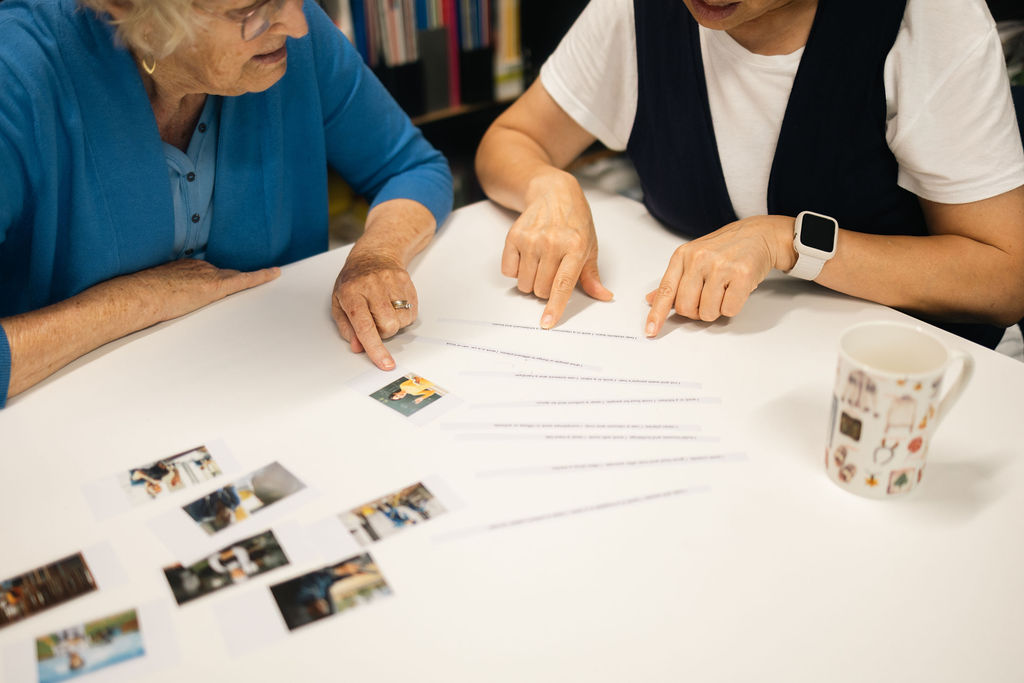Whakatāne volunteers are playing a crucial role in helping migrants and people with a refugee background settle into their new community. While their focus is on teaching English, the support the volunteers offer goes far beyond language lessons. The volunteers are also providing opportunities for people from migrant and refugee backgrounds to learn about culture, to build strong community relationships, and to gain the confidence they need to navigate everyday life in New Zealand.
Glenys Sweetman is one of the volunteers. She explains that she and her fellow volunteers became involved with English Language Partners (ELP) through an initiative set up through their church, the Whakatāne Baptist Church. The initiative goes back to mid-2023 when the church, in partnership with a funding organisation, took on a refugee sponsorship role. This was part of an Immigration New Zealand (INZ) initiative. It entails the church committing to support a refugee or refugee family during their first two-year settling-in period. As the official sponsor, the church group was required to meet several obligations, one of which was providing English for Speakers of Other Languages (ESOL) support.
“We’d heard about ELP,” says Glenys. “So, we reached out to the Rotorua Centre, and they were happy to get involved.”
Five members of the church community, including Glenys and her husband, signed up for ELP’s 20-hour volunteer training course, which took place in Rotorua. The group made the scenic two-hour return trip between Whakatāne and Rotorua to complete the course, which was split into three sessions.
“We all thoroughly enjoyed it,” says Glenys.
The training covers both language teaching techniques as well as cultural components and equips volunteers with the necessary skills for one-on-one tutoring. The training approach is essential to help people not just learn English, but also understand the cultural specifics of New Zealand. For Glenys and her husband who are both retired language development specialists with extensive overseas careers, the language aspect of the training wasn’t new. However, they found the cultural component particularly valuable.
For us, literacy wasn’t the challenge, but understanding New Zealand’s culture was,” Glenys explains. “We left New Zealand when we were in our twenties, and things have changed a lot since then. The ELP training had fantastic resources that helped us learn more about New Zealand’s culture. That was exactly what we needed.
Glenys believes that local demand in Whakatāne for ESOL support will only grow. The group of volunteers has grown to seven and all are supporting learners. There is a lot of demand and Glenys says they know of more migrants who are interested although they haven’t yet come forward.
“The relationship between a volunteer and a learner is a two-way process,” she says. “It’s based on trust, and we know there are more migrants out there who would benefit from support, but they’re not quite ready to take that step. Building relationships takes time, and that’s key.”
One of the success stories Glenys is particularly proud of is a learner who was passionate about becoming a nurse in New Zealand. Although the learner was already a qualified nurse in her home country, she needed further education to work as a nurse in New Zealand. So, she enrolled in a Bachelor of Health Science degree at Te Whare Wānanga o Awanuiārangi in Whakatāne, majoring in Māori health issues.
“Her main barrier was language,” Glenys explains. “She came to us for one-on-one tutoring. She’s just successfully completed her first year at university, studying in English and also learning important things about Māori culture and health issues which are requirements.” The learner received support with the te reo Māori component of her course through a volunteer tutor from REAP (Rural Education Activities Programme).
Despite the responsibility of having two young children to care for, the learner has found the motivation to succeed, says Glenys. She’s current doing a clinical placement in the Whakatāne district.
On a personal level, Glenys loves the opportunity to engage with people from diverse cultures through her volunteering.
It’s a lot of fun. As you teach, you’re also learning about the people you’re helping and their backgrounds.
Jia Rong Yap, the Rotorua Centre Manager, explains that anyone can become an ELP volunteer as long as they complete the 20-hour training. “We do a number of safety checks, including a police background check, but otherwise, people just need to be genuinely interested in helping people settle in New Zealand,” Jia Rong says.
Although there is no specific time commitment after training, Jia Rong says ELP’s goal is to build long-term relationships with its volunteers: “We encourage volunteers to commit to 12 sessions with learners but of course we like them to continue volunteering for longer.”
For Glenys and the rest of the ELP volunteers in Whakatāne, the work they’re doing isn’t just about teaching English - it’s about making a lasting difference in the lives of people from migrant and refugee backgrounds and helping them thrive in their new community.
We’d love to give a big shoutout to Heather Vail, the previous Centre Manager, who got ESOL home tutoring and the Kiwi English class up and running in Whakatāne. Her hard work and dedication have made a real difference, helping so many learners on their English journey!
Story by Tuo Chinula











.png)






